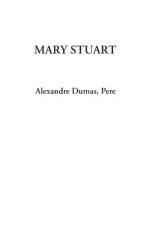In fact, directly the falling night had scattered the crowd and a little quiet was regained, Mary, ceasing to be uneasy on her own account, turned immediately to Bothwell, whom she had been obliged to abandon, and who was now proscribed and fleeing; while she, as she believed, was about to reassume her title and station of queen. With that eternal confidence of the woman in her own love, by which she invariably measures the love of another, she thought that Bothwell’s greatest distress was to have lost, not wealth and power, but to have lost herself. So she wrote him a long letter, in which, forgetful of herself, she promised him with the most tender expressions of love never to desert him, and to recall him to her directly the breaking up of the Confederate lords should give her power to do so; then, this letter written, she called a soldier, gave him a purse of gold, and charged him to take this letter to Dunbar, where Bothwell ought to be, and if he were already gone, to follow him until he came up with him.
Then she went to bed and slept more calmly; for, unhappy as she was, she believed she had just sweetened misfortunes still greater than hers.
Next day the queen was awakened by the step of an armed man who entered her room. Both astonished and frightened at this neglect of propriety, which could augur nothing good, Mary sat up in bed, and parting the curtains, saw standing before her Lord Lindsay of Byres: she knew he was one of her oldest friends, so she asked him in a voice which she vainly tried to make confident, what he wanted of her at such a time.
“Do you know this writing, madam?” Lord Lindsay asked in a rough voice, presenting to the queen the letter she had written to Bothwell at night, which the soldier had carried to the Confederate lords, instead of taking to its address.
“Yes, doubtless, my lord,” the queen answered; “but am I already a prisoner, then, that my correspondence is intercepted? or is it no longer allowed to a wife to write to her husband?”
“When the husband is a traitor,” replied Lindsay, “no, madam, it is no longer allowed to a wife to write to her husband—at least, however, if this wife have a part in his treason; which seems to me, besides, quite proved by the promise you make to this wretch to recall him to you.”
“My lord,” cried Mary, interrupting Lindsay, “do you forget that you are speaking to your queen.”
“There was a time, madam,” Lindsay replied, “when I should have spoken to you in a more gentle voice, and bending the knee, although it is not in the nature of us old Scotch to model ourselves on your French courtiers; but for some time, thanks to your changing loves, you have kept us so often in the field, in harness, that our voices are hoarse from the cold night air, and our stiff knees can no longer bend in our armour: you must then take me just as I am, madam; since to-day, for the welfare of Scotland, you are no longer at liberty to choose your favourites.”




